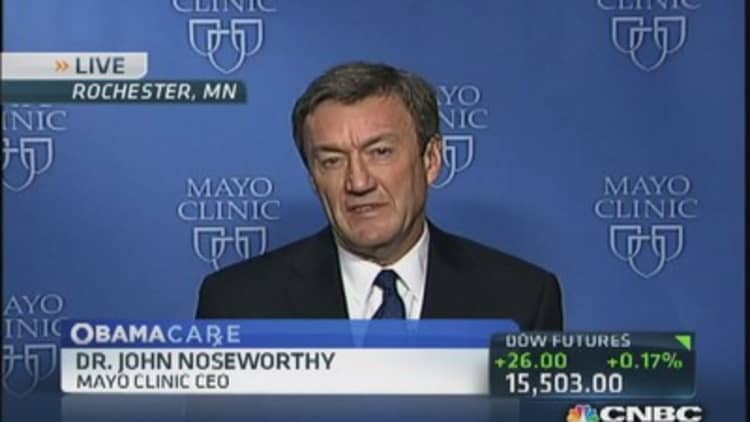
Obamacare does nothing to link doctors' fees to their performance and reduce health-care costs, the head of the Mayo Clinic told CNBC on Friday.
"The Affordable Care Act is basically insurance reform—eligibility and access—and basically, they are going to pay for that by reducing the reimbursement. It doesn't modernize how we drive to higher quality care," Dr. John Noseworthy said in a "Squawk Box" interview.
He said that updating reimbursement methods to reflect better outcomes will lower health-care costs. "Right now, we're in a system where we're reimbursing volume of care not quality and outcomes of care—safety, efficiency and so on. And that's where most of the costs are."
Noseworthy sppoke a day after the head of The Cleveland Clinic, Dr. Toby Cosgrove, told "Squawk Box" that Obamacare is going to have "unintended consequences" that will need to be addressed, but "imperfections" will be changed over time.
(Read more: Obamacare may need years to get fix: Cleveland Clinic CEO)
The most immediate imperfection that the Obama administration is trying to fix is the tech trouble with federal online exchange where uninsured Americans in 36 states can buy coverage.
New documents released by the House Oversight and Government Reform Committee show that just six enrollments were completed in the first 24 hours of the Oct. 1 launch of Healthcare.gov. The Health and Human Services Department won't be releasing sign-up figures until mid-November.
(Read more: Dismal HealthCare.gov debut numbers)
Noseworthy, president and CEO of the Mayo Clinic, said the tech issues are important to fix, but he brought the discussion back to the need to modernize reimbursement methods. He used examples from his nearly 30 years as a neurologist to make his case. "Probably 30 percent of the patients I saw were misdiagnosed, had the wrong tests done. Some of them were treated inappropriately."
The current way physicians are paid has "nothing in there to really motivate and stimulate moving towards a more efficient system," he said. Any upgrade would be a "stepwise approach to say, 'How do we measure outcomes; how do we look at readmission rates, accuracy of diagnosis, rate of infection?'" he continued. "And then [let's] have a transparent database that patients can look at and say, 'Who gets it right more often and what contributes to that?'"
This idea of consumer-driven health care is the backbone of Obamacare. But one of its nuts-and-bolts provisions stipulates that insurers adhere to a new, wider standard of what has to be covered. One of the consequences has been that people who bought insurance on their own in the private market are getting or may get cancellation notices, because their current plans fall short of the new requirements.
(Read more: White House knew millions couldn't keep health plans)
After a grilling before a House panel on Wednesday, HHS Secretary Kathleen Sebelius is scheduled to appear before the Senate Finance Committee next week, when she could face more questions about the cancellations and the progress being made to fix federal online exchange.
—By CNBC's Matthew J. Belvedere. Follow him on Twitter @Matt_SquawkCNBC.


